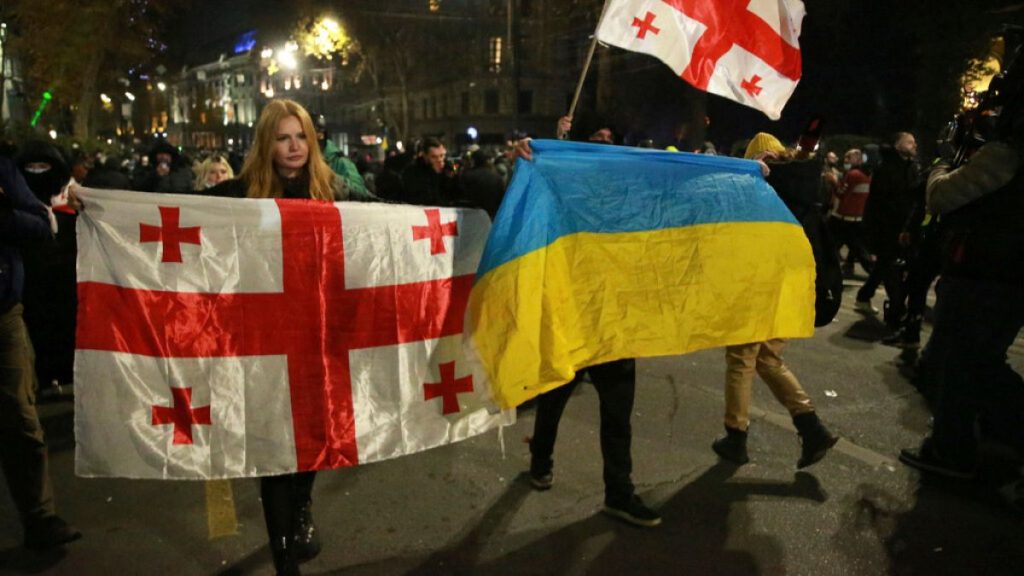In recent days, Georgia has witnessed a surge of public dissent as thousands of demonstrators took to the streets for the seventh consecutive night to voice their outrage over the government’s decision to suspend negotiations on the country’s accession to the European Union (EU). This unrest has sparked a reevaluation of Georgia’s political trajectory, particularly regarding its relationship with Russia. President Volodymyr Zelenskyy of Ukraine, adding to the fervor, condemned the ruling Georgian Dream party for allegedly steering the nation toward increased dependence on Russia and signaled efforts to work with European partners on potential sanctions against the Georgian government. Zelenskyy’s comments reflect the broader regional concern about the influence of Russia in former Soviet states and the implications this has on their aspirations for European integration.
The protests in Georgia’s capital, Tbilisi, have been marked by a palpable determination among citizens to reclaim their country’s commitment to EU accession. Demonstrators have rallied under the banners of both Georgian and European flags, emphasizing their desire for alignment with European values and standards. Many participants have vowed to sustain their protests until their demands are met, showcasing a vigorous civic engagement that underscores the significance of EU membership for many Georgians. This ongoing movement reflects a broader sentiment among the populace that their government’s actions run counter to national aspirations and their desire for a European future.
Initially, the protests were met with a heavy-handed response from law enforcement, including the use of water cannons and tear gas against demonstrators who attempted to block key areas of the city. Over the course of the protests, approximately 300 individuals were detained, with an additional 100 needing medical treatment for injuries sustained during clashes with the police. However, the latest demonstrations have seen a more restrained approach from the authorities, with riot police refraining from dispersing crowds. This shift indicates a potential recalibration on the part of the government as it grapples with public discontent while aiming to avoid further escalation of violence.
Adding to the complexity of the situation, the Coalition for Change opposition party has reported police actions targeting its leadership in an apparent effort to quell the protests. Nika Gvaramia, the party’s leader, was forcibly taken from the party’s offices, a move highlighted in a disturbing video that captured the tense moment and raised alarms about the treatment of political figures during the unrest. Such incidents suggest an increasingly authoritarian stance from the ruling government, which has justified its actions by accusing the opposition of inciting violence and attempting to destabilize the country. This narrative is likely to resonate with a segment of the population that fears potential chaos resulting from the protests.
Moreover, the raids on opposition offices and NGOs underline the government’s apprehension regarding dissent and its determination to suppress any challenges to its authority. Prime Minister Irakli Kobakhidze has positioned the ruling party as a bulwark against revolutionary fervor, framing his government’s actions as necessary for maintaining order. However, critics argue that these tactics represent a dangerous overreach and a systemic crackdown on democratic processes. This collision between the ruling party’s ambitions and the growing opposition reflects a deepening political crisis in Georgia, further exacerbated by external pressures from neighboring Russia and the EU’s hesitant response to Georgia’s accession ambitions.
In summary, the demonstrations in Georgia encapsulate a critical juncture in the nation’s political landscape, characterized by fierce public dissent against perceived government negligence towards European integration aspirations. Citizen sentiment, largely unified around the goal of EU accession, clashes with the ruling party’s inclination toward maintaining closer ties with Russia. The atmosphere of protest, marked by clashes with law enforcement and targeted actions against opposition figures, raises important questions about the health of democracy in Georgia and the government’s accountability to its citizens. As the situation unfolds, the international community will be watching closely, with implications not only for Georgia’s immediate future but also for the geopolitical balance in the region.














